The working relationship between governments and journalists is, by default, adversarial. But it gets more escalated when the government masks truth with spin, peddles lies in broad daylight, and, worse, threatens journalists for merely quoting official documents or actual court cases.
History, the recent and the forgotten past, has proven how the Philippine government, regardless of who sits in power, has been at odds with the media and journalists. In 1999, President Joseph Estrada encouraged a boycott of the Philippine Daily Inquirer, which some quarters loyal to him heeded. Estrada eventually apologized in 2011.
Fifteen years ago, through Proclamation No. 1017, President Gloria Macapagal-Arroyo declared a state of national emergency. The reason? “Elements in the political opposition have conspired with authoritarians of the extreme Left represented by the NDF-CPP-NPA and the extreme Right, represented by military adventurists… who are now in a tactical alliance and engaged in a concerted and systematic conspiracy…” Sounds familiar? As part of the crackdown, members of the opposition were arrested, including the late Anakpawis representative Crispin Beltran. The office of the Daily Tribune was raided by the Philippine National Police. Then PNP Chief Arturo Lomibao recommended state control of the newspaper, but the paper’s editor in chief Ninez Cacho-Olivares said, “I’ll be damned if I let them control me.” Her words should echo to this day.
Not so long ago, on different occasions, President Benigno Aquino III criticized the media for allegedly only telling the bad news in government, for supposedly focusing on negative stories instead of the good news.
And five years into his term, President Duterte has consistently attacked the media.
In the era of post-truth, when lies have become accepted as the mainstream narrative for people to reinforce their hold on power, one way to keep democracy alive—if it has not died yet—is to safeguard the institutions that speak the truths we ought to read and hear. Democracy thrives if we fight the lies and straighten the twists in the discourse. It flourishes when dissent is not falsely equated with terrorism.
Being timid amid wanton red-tagging and ad hominem attacks, whether made by actual people who are loyal supporters of the administration or by paid trolls who hype online activity to support propaganda, is not an option. Staying silent while critics are unfairly attacked is not an option.
Do not shoot the messenger, as the cliché goes. In these parts, the messengers are attacked, the message is twisted, and the audience is stifled. Resistance thus becomes a must, a continuing duty regardless of administration, as the alley for free expression becomes much narrower.
Edward Joseph H. Maguindayao,ehmaguindayao@up.edu.ph


